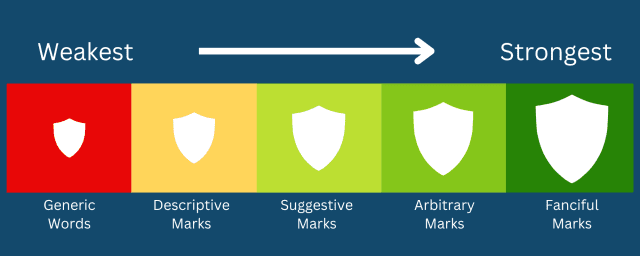A “trademark” is any word, phrase, logo or design that identifies the source of goods or services. Trademarks are used to distinguish one’s products and services from those of another. The strength of a trademark depends on its distinctiveness. Along the distinctiveness spectrum are five generally recognized categories of trademarks, which are described below from strongest to weakest.
Fanciful Trademarks: These marks have no inherent meaning in any language, but are instead invented or coined specifically as a brand to identify goods or services. Fanciful marks offer the greatest protection against those who later may use the same or similar marks for related goods and services. Examples of fanciful marks include PEPSI and KODAK.
Arbitrary Trademarks: Marks in this category have an everyday dictionary meaning, but are used in connection with goods or services that are completely unrelated to that inherent connotation. Arbitrary marks include APPLE and BLACKBERRY. While these words commonly denote types of fruit, nearly everyone recognizes them as brands of smart phones and other technology.
Suggestive Trademarks: These marks hint at or suggest some quality or characteristic of goods or services, but do not directly describe them. Suggestive marks require imagination, thought or perception to connect them to the goods or services, but do not immediately convey what those goods or services are. SWEETARTS, KITCHENAID, and EASY-BAKE fall into this category.
Descriptive and Laudatory Trademarks: Descriptive marks directly describe an ingredient, quality, characteristic, function, feature, nature, purpose, or use of the goods or services with which they are used. Such marks cannot, at least initially, gain all the benefits of a registration on the US Patent and Trademark Office’s Principal Register. However, if over time a descriptive mark acquires distinctiveness and customers begin to associate it with certain goods or services, such a mark may be registrable. Examples of descriptive marks include APPLE PIE for apple pie scented potpourri, and OATNUT for bread containing oats and hazelnuts. Additionally, laudatory terms such as BEST and PREMIER fall within this category. Descriptive trademarks are the weakest type of mark that may be registered.
Generic Words: These words are not trademarks and cannot be registered because they do not function as a source identifier. Rather, generic words represent a common name for the goods or services themselves. Take, for instance, the examples of APPLE and BLACKBERRY listed above as arbitrary marks for smart phones. If, instead, these terms were used to promote the actual fruit they describe, they would be generic and unregistrable. Likewise, terms like SALAD DRESSING or POTATO CHIPS when used in connection with those goods are generic and cannot be protected.
Oftentimes, descriptive or suggestive marks are preferred for marketing purposes, because they quickly convey the type of goods or services being offered and generally require less marketing effort and expense to build brand recognition. However, arbitrary and fanciful marks offer greater protection because they do not have any immediately recognizable association with the goods or services. Although it is more difficult to build brand recognition with these types of marks, they offer the best protection and are the easiest to enforce and defend against infringement.
For more information on selecting a strong and distinctive trademark and how to protect your marks, please contact David M. DiSegna. For a pdf version of this Client Alert, please click here. Partridge Snow & Hahn LLP is available to answer your questions about your company’s trademarks and other intellectual property.



